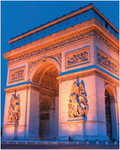Laura K. Lawless's Blog: Lawless Languages, page 390
April 20, 2015
Dishes and Silverware

 When it's your turn to set the table, you definitely need to know the difference between une assiette and une serviette. Check out this lesson to learn the French names for a variety of dishes, silverware, and pots and pans.
When it's your turn to set the table, you definitely need to know the difference between une assiette and une serviette. Check out this lesson to learn the French names for a variety of dishes, silverware, and pots and pans.








April 19, 2015
Arc de Triomphe

 Qui n'a jamais vu, ne serait-ce qu'une seule fois, dans des atlas géographiques ou des manuels d'histoire, l'imposante majesté de l'Arc de Triomphe de Paris, sur lequel débouche la magnifique avenue des Champs-Élysées, et dont l'allure caractéristique représente si bien la France ?
Qui n'a jamais vu, ne serait-ce qu'une seule fois, dans des atlas géographiques ou des manuels d'histoire, l'imposante majesté de l'Arc de Triomphe de Paris, sur lequel débouche la magnifique avenue des Champs-Élysées, et dont l'allure caractéristique représente si bien la France ?








April 18, 2015
Inversion
 The normal word order in French and English is subject + verb, as in vous êtes - you are. Both languages also have what is known as inversion, where the verb and subject pronoun switch places, resulting in êtes-vous - are you. In English, inversion is used only to ask questions, but in French it has several different purposes.
The normal word order in French and English is subject + verb, as in vous êtes - you are. Both languages also have what is known as inversion, where the verb and subject pronoun switch places, resulting in êtes-vous - are you. In English, inversion is used only to ask questions, but in French it has several different purposes.








April 17, 2015
Ou quoi ?
April 16, 2015
Metz

 Metz (Moselle) est une ville aux couleurs vives. C'est un endroit idéal pour ceux qui aiment se balader le long des quais et qui apprécient les écrins de nature en ville.
Metz (Moselle) est une ville aux couleurs vives. C'est un endroit idéal pour ceux qui aiment se balader le long des quais et qui apprécient les écrins de nature en ville.








April 15, 2015
Adverbs of Time
April 14, 2015
NG
 The letter combination ng at the end of a French word is pronounced the same way as in English. When followed by one or more letters, the n is nasal and the g follows the normal rules.
The letter combination ng at the end of a French word is pronounced the same way as in English. When followed by one or more letters, the n is nasal and the g follows the normal rules.








April 13, 2015
Descriptions

 Setting up an online dating profile, talking to friends about someone you met, bragging about a new baby, and telling the police about a suspect have one thing in common: physical descriptions. Learn all the French vocabulary you need to describe the most common physical characteristics.
Setting up an online dating profile, talking to friends about someone you met, bragging about a new baby, and telling the police about a suspect have one thing in common: physical descriptions. Learn all the French vocabulary you need to describe the most common physical characteristics.








April 12, 2015
New Features
Bonjour les Francophiles ! I hope your French studies are coming along nicely. This is just a quick note to let you know about two new features I've recently added to the site: lessons sorted by level and printer-friendly pages.










 Are you going to read this lesson on the informal French expression ou quoi or what?
Are you going to read this lesson on the informal French expression ou quoi or what?
 Adverbs of time express when the action of a verb occurs.
Adverbs of time express when the action of a verb occurs.

 Learn about Matisse, the painter and sculptor who launched the Fauvism movement.
Learn about Matisse, the painter and sculptor who launched the Fauvism movement.


